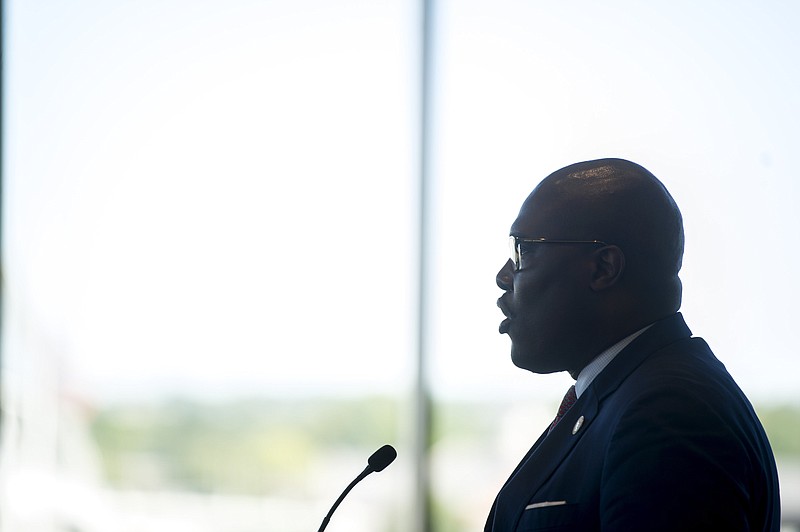Next year's proposed general fund budget for the city of Little Rock would keep spending essentially flat, with revenue and expenses balanced at approximately $222 million, members of the Little Rock Board of Directors were told during a budget presentation Tuesday.
Compared with the original 2021 general fund budget of $210 million, the proposed 2022 budget represents an increase.
However, the proposed budget keeps revenue and expenses in line with the 2021 amended budget, which saw total general fund revenue revised to approximately $224 million and expenses to nearly $222 million, for a net gain of close to $2.3 million.
Across all funds -- they include the aforementioned general fund in addition to the city's street, waste disposal, fleet, vehicle storage and parking garage funds -- net income is expected to be $1.4 million, according to the 2022 budget proposal.
Board members will have to formally approve a budget proposal sometime before the end of the year.
City finance director Sara Lenehan delivered the presentation at Tuesday's agenda meeting. At the outset, she explained that needs that are not included in the budget may be addressed with other funding sources if desired by the board.
Lenehan named the Dec. 31 expiration of the three-eighths percent (0.375%) sales tax for capital projects, "which eliminates one of the major sources we've had for capital funding," she noted, as well as the April 2022 retirement of street and drainage bonds. An election in 2022 would be required to renew those bonds and continue a 3.0-mill levy for streets and drainage past the end of 2022, according to her presentation.
Mayor Frank Scott Jr. had pushed for a sales-tax increase meant to fund quality-of-life improvements that would have taken the overall rate on purchases in the city to 9.625% when accounting for state, county and local sales taxes beginning in January.
The increase failed in a Sept. 14 referendum. As a result, in light of the expiration of the three-eighths percent tax for capital improvements, the overall sales-tax rate will drop to 8.625% next year.
The prediction for the city's local sales-tax revenue was for collections to remain basically flat, with $65.9 million in revenue projected for 2022 compared with $65.96 million in this year's amended budget, according to Tuesday's presentation.
Little Rock also receives a share of the revenue from the county's 1% sales tax, and officials project the city's revenue from this source will decrease slightly in 2022 compared with the 2021 amended budget for a total of approximately $51 million next year.
Revenue from fines and fees was predicted to increase next year by about 14.8% compared with the 2021 amended budget, Lenehan said, for a projected total of $1.93 million.
Approximately 82% of the city's general-fund revenue is generated by a combination of sales taxes, property taxes and franchise fees, with sales taxes in particular providing over half of the general-fund revenue, according to Lenehan's presentation.
General-fund revenue before transfers were projected to exceed $220 million next year compared with $219.3 million in the 2021 amended budget. The figure represents an increase of $760,753, up 0.35% from the amended 2021 budget.
The proposed 2022 budget includes a 1.5% across-the-board salary increase. The pay increase would be added to all of the step-and-grade progressions for employees covered by the fire and police unions as well as the American Federation of State, County and Municipal Employees, plus 911 operators, according to Lenehan.
The cost of the salary increase has been budgeted at $2.22 million.
Lenehan cautioned board members that the item may still get tweaked. She said officials were still negotiating with the unions and examining whether additional revenue could allow them to increase pay any further. She estimated that the past salary increase for police and fire personnel, beyond step-and-grade, came in 2018, while non-union, non-uniformed employees last saw increases in 2017.
Lieutenants and majors in the Police Department would receive an additional 1% pay increase under the 2022 budget "to address some of the compression issues that they're experiencing," according to Lenehan. A recruitment incentive for police is set to see a boost from $5,000 to $10,000 at a cost of $300,000, according to the budget proposal.
Personnel changes in the 2022 proposed general-fund budget would add 23 positions at a price of nearly $2.3 million, according to the presentation, resulting in a total of 1,727 full-time positions included in the general fund.
Full-time staffing at the Office of Executive Administration will increase from 28 to 30, not because of an actual increase, Lenehan said, but rather because those two positions are being consolidated from the Department of Community Programs to the Office of Diversity, Equity and Inclusion.
The city attorney's office will gain two positions after requesting an assistant city attorney and a paralegal, Lenehan said. Another position in the office will be upgraded from an assistant to an administrative office manager, she said.
In the Police Department, a net decrease of 60 positions in the 2022 budget is tied to the transfer of 65 positions to the new Emergency Communications Department, she explained. The Police Department will add three telephone reporting clerks, a county jail reimbursement position and a crime analyst position, Lenehan said.
Police, fire and 911 personnel make up 53.8% of the full-time workforce across all funds in the 2022 budget, with 1,192 of the 2,216 full-time employees, she said.
In outside-agency allocations, the Arkansas Museum of Fine Arts is to get an increase of $400,000 next year because of its scheduled fourth-quarter opening after an overhaul. The city's allocation for a local nonprofit, the Downtown Little Rock Partnership, will increase by $50,000 to encompass other annual contracts for which the city was paying, Lenehan said.
